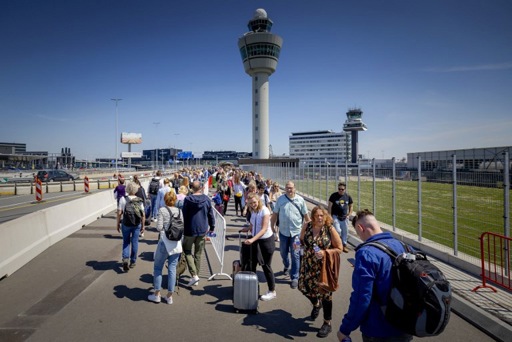Some airports are considering adapting their safety rules through new technology to avoid repeating the travel chaos of last summer. These include Amsterdam's Schiphol airport as well as different airports in the UK.
After 9/11, security checks were significantly tightened, which created longer queues. After two years of pandemic restrictions, the problem had significantly worsened, despite it being of their own making, with some airports not able to handle the sharp increase in passengers.
Staff shortages led to thousands of cancelled flights, a headache for travellers as well as for the recovery of the travel sector.
Yet the issues haven't been resolved and could repeat themselves at the end-of-year festivities, especially in the UK airports which could see disruption due to strikes. The travel sector is concerned about when travel is expected to get even busier next summer.
All hands on deck
Airports are trying to recruit new staff to address capacity issues. In addition, new technology and adjusted rules for security could make security checks run more smoothly.
Schiphol is working on upgrading software to reduce the number of error messages when scanning luggage, announced Schiphol airport CEO Ruud Sondag earlier this week when he presented the airport's recovery plan for summer 2023.
Related News
- National demonstration: One metro line running in Brussels, 60% of flights cancelled
- Brussels Airport: Over 200 flights cancelled on Friday
Amsterdam's airport already uses CT scanners, which generate 3D images of the content of suitcases, which lets passengers keep laptops in their bags.
But liquids still have to go through security separately.
2 litres of liquid
The UK government is working to change these rules so that by June 2024, UK airports would have the latest generation of security scanners that can scan liquids, including sun scream or water bottles, while they are stowed in hand luggage. Transport Minister Mark Harper announced a new bill to let travellers carry up to 2 litres of liquid on flights.
In the EU, "larger quantities are also allowed onboard, provided they are controlled with approved security equipment. It is a choice of the airport to invest in this," a Commission spokesperson told De Standaard.
"Several major airports in the EU are now taking steps to have all liquids automatically scanned," they added.
At Brussels Airport there are currently no plans to modernise the infrastructure as Brussels has been less impacted by long queues compared to other airports.

